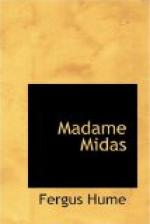So there it stood—a dingy shingle roof overgrown with moss—a quaint little porch and two numerously paned windows on each side. On top of the porch a sign-board—done by Slivers in the early days, and looking like it—bore the legend ‘Slivers, mining agent.’ The door did not shut—something was wrong with it, so it always stood ajar in a hospitable sort of manner. Entering this, a stranger would find himself in a dark low-roofed passage, with a door at the end leading to the kitchen, another on the right leading to the bedroom, and a third on the left leading to the office, where most of Slivers’ indoor life was spent. He used to stop here nearly all day doing business, with the small table before him covered with scrip, and the mantelpiece behind him covered with specimens of quartz, all labelled with the name of the place whence they came. The inkstand was dirty, the ink thick and the pens rusty; yet, in spite of all these disadvantages, Slivers managed to do well and make money. He used to recommend men to different mines round about, and whenever a manager wanted men, or new hands wanted work, they took themselves off to Slivers, and were sure to be satisfied there. Consequently, his office was nearly always full; either of people on business or casual acquaintances dropping in to have a drink—Slivers was generous in the whisky line—or to pump the old man about some new mine, a thing which no one ever managed to do. When the office was empty, Slivers would go on sorting the scrip on his table, drinking his whisky, or talking to Billy. Now Billy was about as well known in Ballarat as Slivers, and was equally as old and garrulous in his own way. He was one of those large white yellow-crested cockatoos who, in their captivity, pass their time like galley-slaves, chained by one leg. Billy, however, never submitted to the indignity of a chain—he mostly sat on Slivers’ table or on his shoulder, scratching his poll with his black claw, or chattering to Slivers in a communicative manner. People said Billy was Slivers’ evil spirit, and as a matter of fact, there was something uncanny in the wisdom of the bird. He could converse fluently on all occasions, and needed no drawing out, inasmuch as he was always ready to exhibit his powers of conversation. He was not a pious bird—belonging to Slivers, he could hardly be expected to be—and his language was redolent of Billingsgate. So Billy being so clever was quite a character in his way, and, seated on Slivers’ shoulder with his black bead of an eye watching his master writing with the rusty pen, they looked a most unholy pair.




